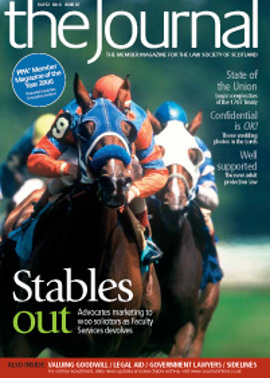A door almost shut

Juries under wraps
I wonder how far the rage for transparency has got us. Presumably, like most things, its time will pass and it will be at one with Tyre and Sidon, but before that happens, one wonders, for example, if trial by jury will go unscathed?
The great thing about this form of criminal enquiry, as was pointed out in the recent case of Clow v HMA [2007] HCJAC 24; 2007 GWD 14-277, is that it all depends on the theory that the jury loyally accept and apply directions given to them. The general ethos of government recently, however, has been a reluctance to trust those involved at any level of the legal system to do their job properly, and unless there is a big change, in time we may find that somewhere a civil servant has convinced a minister to update the jury system, probably on the basis that it is not fit for a Modern Scotland.
In Clow, correspondence had been sent by one of the jurors after the verdict, asserting inter alia that the jury had thought the accused guilty from early on and had blamed her for their jury service lasting so long. It was held that the considerations discussed in the English case of R v Mirza [2004] UKHL 2 were equally applicable in Scotland and that the trial judge having repeatedly told the jury that they should decide the case according to the evidence, they must be assumed to have done so.
The court also held that the passage in Hume which states that a juror who has been party to a verdict cannot impeach it after it has been recorded, applied to actings both before as well as after the jury was enclosed. Similarly, the decision in Ready v HMA [2007] HCJAC 15, thought to apply perhaps to the stage of the trial when the jury was actually discussing its verdict, was equally applicable to discussions in the jury room before enclosure. It was observed that it was not necessary in the present case to hold that in no circumstances whatsoever would the court make enquiries after a verdict was reached, as the matters complained of in Clow were intrinsic to the jury’s consideration. This does not seem to leave the door very wide open, but it could be said that it is not quite shut and it must be hoped that this may be enough to discourage legislative meddling. (Now, isn’t that a funny thing: just as this was written the Attorney General announced plans for research into contempt of court by means of prior newspaper reporting affecting subsequently empanelled juries.)
Relevant evidence
There are a couple of cases reported in 2007 GWD 12, which come under the general heading of fairness. The first, at para 242, is McArthur v HMA [2006] HCJAC 83 which contains a number of points, one of which is generally worth considering here. The charge was one of murder and the appeal was to the effect that a statement taken from one of the accused, not under caution, should not be admitted in evidence and that in any event it was irrelevant. The court held that at the time the statement was given, the appellant had been a witness, not a suspect. Accordingly, it seems that fairness is judged in terms of what is known at the time of the act. On the further point, evidence about the appellant having previously worked as a slaughterer of sheep was held to be relevant given that he was here charged with dismembering a body.
The other case, Moir v HMA [2007] HCJAC 20; 2007 GWD 12-243, was an appeal against conviction which succeeded on the basis that because certain statements by the complainer had been excluded by the judge, it could not be said that a miscarriage of justice had not occurred. The statements related to an alleged visit by the complainer to the procurator fiscal depute for the purpose of withdrawing the charges, at which she was told that it was too late. It was held that while the purpose behind the visit and the likely outcome of questioning in court were speculative, the effect of not allowing this matter in was to preclude the defence from following a particular line of questioning, and the appeal was allowed.
Bail sentencing
The third case of note reported in that issue (at 244) is Robertson v Donaldson [2007] HCJAC 22, which, although not so dramatic, is important. This was an appeal against sentence, the appellant having been sentenced both for breaching a bail condition and for a bail aggravation. It was held that where a person was charged with an offence under s 27(1)(b) of the Criminal Procedure (Scotland) Act 1995, he did not fall under the provisions of subs (3) and accordingly it was not competent to libel a bail aggravation in respect of the same bail order as formed the subject matter of the substantive offence.
Full bench pending
Another case which perhaps does not sound spectacular but is potentially of considerable importance, is Minto v Spiers 2007 GWD 14-279. A total sentence of 10 months’ imprisonment had been imposed in respect of, inter alia, a charge of assault and a charge under the Police (Scotland) Act 1967, for which the appellant received four and six months respectively. The sentencing sheriff recognised that she was confined by the maximum of nine months available in relation to the statutory charge. It was however argued, following Fleming v Munro 1997 SCCR 527, that the maximum actually available was six months, that being the sentence actually imposed on that charge. The case was remitted to a court of five judges, as it dealt with a relatively common situation which required clarification, for reconsideration of Fleming, which it was said appeared to proceed on the basis of a concession by the Crown and there were doubts about its soundness.Possession issues
Wali v HMA [2007] HCJAC 11; 2007 GWD 13-264 is a case about that tricky problem, how do you prove that a person is in possession of something inside something else? In the case in question, that charge related to possession of CS canisters found in a rucksack in a flat of which the appellant was sole occupant. It was argued that there was insufficient evidence that the appellant was in possession of the contents of the rucksack. It appeared from further directions asked of the presiding judge by the jury that they were contemplating holding that possession of the flat together with knowledge of the rucksack might constitute possession. It was held that the presiding judge should have directed them that it was necessary that the appellant also had knowledge that there were contents and had control of them.
Another Moorov case
It would be difficult to overestimate the importance to criminal jurisprudence of the Moorov doctrine, which must surely have prevented many wrongous acts from going unpunished through the perpetrator not confining himself to one victim alone. A recent application of the doctrine is to be found in K v HMA [2007] HCJAC 28; 2007 GWD 17-297, which involved charges of indecent behaviour at different times towards two nieces. The court held that the trial judge had been correct in repelling a submission of no case to answer inasmuch as there were sufficient similarities between the events involving the two girls. These included the ages of the girls, the fact that they were the appellant’s nieces, that the abuse was clandestine and conducted on the appellant’s business premises, that it took place at night when the girls were in nightclothes, that the appellant engineered situations in which he was alone with the girls, and the actual details of the abuse itself.
Tailpiece
A few years ago now a chap called Arthur Coote used to turn up from time to time in these pages. He was a freelance journalist with a roving commission and some ideas of his own. He has just been in touch again.
“Salutations, my old chum and how goes the struggle? Just back from a fact-finding tour searching a major series on ‘Whether Justice?’ for the Debatable Lands Free Press. In courts from Buckie to Ballantrae the cry goes up, ‘What’s happening to summary trials?’ Seems that it used to be a couple of quick witnesses who saw it all, a stout denial from the guilty chaps then it was in the lap of the gods and all done and dusted by lunchtime. But nowadays folk seem positively bursting to get to trial as it’s their only chance of showing that the police didn’t investigate the thing properly, that the PF shouldn’t have charged them in the first place, they should never have been on a curfew in the meantime and that far from being in the frame they are the victims of a miscarriage of justice.”
Naturally I have not responded to the old fool.
In this issue
- Court plans with little appeal
- Winning ways
- Forward steps
- Bar to progress
- Dean urges solicitors to stay with fee scheme
- The Union and the law
- Public and confidential
- Adult support: a new generation
- Advice deserts and PDSOs
- Vision 20:20
- Benevolent Fund: a much valued support
- Termites in the basement
- The value of goodwill
- Letters of Engagement Roadshow
- A door almost shut
- Lessons in improvements
- Null from the outset?
- The Tevez affair
- Scottish Solicitors' Discipline Tribunal
- Website reviews
- Book reviews
- Held in check
- Possession undisturbed






